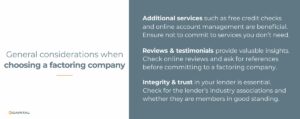
Top 8 Things to Understand Before Signing With A Non-Recourse Factoring Company
Content
Current economic conditions can best be described as “uncertain.” Growth in the US economy continues to come in above expectations, yet short-to-medium-term downside risks still cloud the outlook. While the Feds have managed to avoid a recession and bring down inflation, commercial bankruptcy rates are surging. Bankruptcy filings in June 2024 have reached the highest number recorded in a single month since at least the start of 2020.
In this business environment, invoice factoring is continuing to escalate as a preferred business financing option for companies seeking a flexible funding solution to support sustainability. For companies already utilizing invoice factoring and those just now becoming familiar with this powerful financing option, non-recourse factoring is starting to take center stage as a risk-mitigating strategy to minimize the dangers of bad debt.
In a non-recourse factoring agreement, the factoring company assumes the credit risk for the invoices it purchases. This means that if the customer doesn’t pay the invoice due to bankruptcy, the responsibility for the loss falls on the non-recourse factoring company, not the business that sold the invoices. But as with any financial arrangement, the devil is in the details. While working with a non-recourse factoring company can offer numerous advantages, reading the contract’s fine print and knowing what to expect is essential. Here are the top 8 things to look for and fully understand before signing with a non-recourse factoring company.
What to understand when working with a non-recourse factoring company
1. Definition of ‘non-recourse’
The term “non-recourse” can vary from one factoring company to another. Ensure you understand under what conditions you are protected from customer defaults and non-payments. This clarity is vital for assessing the actual value of your non-recourse factoring agreement. When shopping for a non-recourse factoring company, knowing the terms and conditions of the coverage they offer and ensuring it aligns with the funding needs and bad debt protection your company requires is essential.
2. Fee structure
The fee structure for non-recourse factoring can vary by provider and is generally higher than that of recourse factoring due to the added risk that the factoring company takes on. Here are some of the main components of the fee structure that you may encounter with a non-recourse factoring company:
Factoring fee: This is the primary fee, generally charged as a percentage of the invoice amount. This fee compensates the non-recourse factoring company for expediting payment and taking on the risk of non-payment by your customer. In non-recourse factoring, this fee is usually higher than in recourse factoring. Depending on various factors like the creditworthiness of your clients, the volume of invoices, and your industry, a non-recourse factoring company may charge from 0.5% to 1.0% higher than recourse factoring.
Advance rate: This is the percentage of the invoice amount you receive upfront from the non-recourse factoring company within hours of submitting the receivable for financing. The remaining balance is paid once the customer settles the invoice. Typical advance rates might range from 70% to 90%, minus the factoring fee and any additional service fees. The best non-recourse factoring companies specializing in freight factoring can offer up to 100% advance rates to trucking companies with creditworthy customers.
Reserve amount: When a non-recourse factoring company’s advance rate is less than 100%, they typically hold the unpaid portion of the invoice amount as a reserve until the business’s customer pays the invoice. Once the factoring company receives full payment of the invoice, the reserve amount is immediately released and transferred to your business account.
Additional service fees: Some non-recourse factoring companies charge extra for additional services like money transfers, credit checks on your clients, and administrative tasks. Make sure you understand what these are and how much they cost.
Volume discounts: Some non-recourse factoring companies offer tiered pricing based on the volume of invoices you’re factoring. Higher volumes may result in lower fees.
Transaction fees: There may also be per-transaction fees every time you submit a new batch of invoices for factoring. These are generally nominal but can add up.
Early Termination Fee: If your agreement has a fixed term and you wish to terminate early, there may be an early termination fee. Always check the specifics of this clause in your non-recourse factoring company’s contract.
Miscellaneous fees: Always ask your non-recourse factoring company about any other potential fees, like setup fees, renewal fees, or fees for breaking the minimum invoice volume requirements, so you aren’t caught off guard.
3. Contract length and termination
Check for the minimum contract length and understand the termination process, including any penalties for early termination. Make sure these terms align with your business needs.
4. Due diligence process
A non-recourse factoring company undertakes a due diligence process to assess the risk of purchasing your invoices. Given that the factoring company assumes the risk of non-payment from your customers, this evaluation is often more comprehensive than what you’d find with recourse factoring.
The first step usually involves an assessment of your business’s financial health to help the non-recourse factoring company determine your reliability as a business partner. Next, the focus shifts to your customers. The non-recourse factoring company will assess their creditworthiness by reviewing their payment histories, credit scores, and other financial data. Since the factoring company assumes the risk of non-payment, they want to be assured that your customers are financially stable and likely to pay their invoices on time.
Finally, the non-recourse factoring company will typically perform compliance checks to ensure that your business and its operations adhere to relevant laws and regulations.
5. Customer interaction
Your non-recourse factoring company will likely interact directly with your customers when collecting payments. If a customer company becomes bankrupt, the collection team may negotiate payment plans and settlements or work with legal professionals to minimize the factoring company’s losses. Ensure the collection team excels in servant leadership to reflect well on your business and protect your company’s brand reputation as they work to maximize the recovery of funds.
6. Industry experience
Industry-specific experience and expertise can include specific collection strategies that facilitate a more successful collection process when dealing with bankrupt customers. A non-recourse factoring company with fewer losses in an industry can offer better factoring rates to businesses in that industry.
7. Confidentiality clause
A confidentiality clause with a non-recourse factoring company protects sensitive information related about your business and the factoring company. Since factoring often involves disclosing business-critical information such as customer lists, financial statements, and other proprietary data, maintaining confidentiality is crucial.
The clause generally stipulates that neither party will disclose confidential information to third parties, both during and after the termination of the agreement. This is especially critical for preserving your business relationships and competitive advantage. If the non-recourse factoring company interacts with your customers to collect invoice payments, the confidentiality clause might also specify how and what information they are permitted to share.
In some cases, there may be exceptions to the clause, such as when disclosure is required by law or in the event of a legal dispute between your business and the factoring company. These exceptions would typically be explicitly defined in the agreement.
8. Dispute resolution
Dispute Resolution in a non-recourse factoring agreement refers to the procedures and mechanisms to handle disagreements or conflicts between the parties involved, namely your business and the non-recourse factoring company. Since non-recourse factoring involves transferring rights to your invoices and assumes the risk of non-payment by your clients, disputes can arise regarding various issues, such as service fees, customer payments, or the interpretation of contract terms.
The Dispute Resolution clause usually outlines the steps to be taken if such disagreements occur. The initial step is commonly negotiation, where both parties attempt to resolve the issue through direct communication. If that fails, the agreement might prescribe mediation, where a neutral third party facilitates a resolution.
If both negotiation and mediation fail, the agreement may specify that the dispute goes to arbitration, another form of alternative dispute resolution. Unlike a public court, arbitration is usually quicker and less formal, although the decision is generally binding.
General considerations when choosing a factoring company
Whether entering an arrangement with a recourse or non-recourse factoring company, the factoring company you choose to work with becomes a financial partner for your business. Ensure the relationship is the best fit for your organization. The following are three more general considerations when choosing a non-recourse factoring company:
Additional services: Some factoring companies offer add-on services like credit checks or online account management. Ensure you’re not paying for services that are unnecessary for your business.
Reviews and testimonials: Always check online reviews and ask for references before committing to a non-recourse factoring company. Other businesses’ experiences can give you valuable insight into what service level to expect from your alternative lender.
Integrity and trust: Ensure the non-recourse factoring company complies with industry standards and is recognized as a reputable lender. Check for the lender’s industry associations and whether they are members in good standing.
Conclusion
Although working with a non-recourse factoring company can offer numerous advantages to businesses seeking additional protection from bad debt, it is critical to understand under what conditions you are protected, as each lender has different terms and conditions. In addition, understanding the fee structure is equally essential for determining whether it’s the right option for your business. Always ask for a detailed breakdown of fees and read the agreement carefully to grasp the full consequences of the contract. Consult with a financial advisor to ensure you fully understand the financial implications of entering into a contract with a non-recourse factoring company.
Paying attention to these 8 details of a non-recourse factoring agreement will help you be better prepared to make an informed decision that aligns with your business’s financial needs and operational goals.
Key Takeaways
- The number of business bankruptcies in June 2024 has reached the highest number recorded in a single month since at least the start of 2020.
- A non-recourse factoring company finances invoices and assumes the loss if an invoice is not paid due to bankruptcy.
- Learn the top 8 things to look for and fully understand before signing with a non-recourse factoring company.
- The non-recourse factoring company you choose to work with becomes a financial partner for your business. Ensure the relationship is the best fit for your organization.
- When choosing a non-recourse factoring company, make an informed decision that aligns with your business’s financial needs and operational goals.
ABOUT eCapital
Since 2006, eCapital has been on a mission to change the way small to medium sized businesses access the funding they need to reach their goals. We know that to survive and thrive, businesses need financial flexibility to quickly respond to challenges and take advantage of opportunities, all in real time. Companies today need innovation guided by experience to unlock the potential of their assets to give better, faster access to the capital they require.
We’ve answered the call and have built a team of over 600 experts in asset evaluation, batch processing, customer support and fintech solutions. Together, we have created a funding model that features rapid approvals and processing, 24/7 access to funds and the freedom to use the money wherever and whenever it’s needed. This is the future of business funding, and it’s available today, at eCapital.


